-
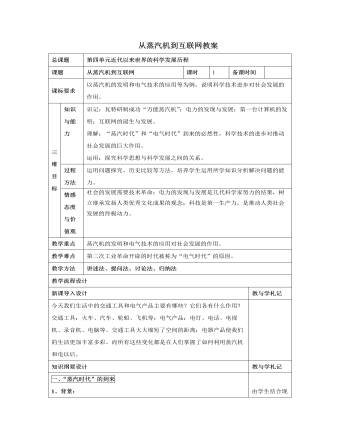
人教版高中历史必修3从蒸汽机到互联网教案
(2)根据材料二与所学知识,从经济、政治、思想文化三个方面,分析欧洲近代科技迅速发展的原因。答:资本主义工商业的成长刺激了对技术的需求,为近代科技的发展提供了工具和手段;资产阶级革命为资本主义发展、科技进步开辟了道路;人文主义和理性精神解放了思想,推动近代科技迅速发展。(如答出其它原因,言之有理,可酌情加分,但不得超过该问总分)(3)根据材料二三与所学知识,分析清代(鸦片战争前)中国科技发展停滞的原因。答:君主专制维系腐朽制度;重农抑商、闭关政策阻碍资本主义萌芽发展;自然经济不能提供近代科技发展的物质基础;文化专制政策(或崇尚理学、八股取士、文字狱等)禁锢思想,摧残人才,阻碍科技发展。(如答出其它原因,言之有理,可酌情加分,但不得超过该问总分。)(4)简述从中西方科技发展变化的历史中得到的启示。答:评分说明:围绕生产力发展,政治经济变革、思想解放与科技发展的关系等任一角度回答,言之有理,均可酌情赋分
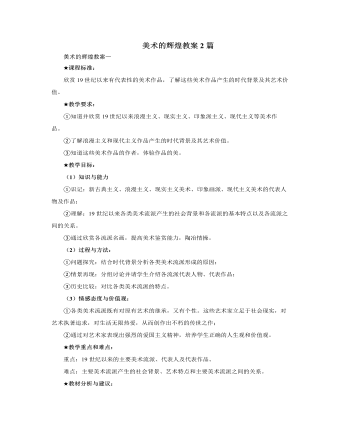
人教版高中历史必修3美术的辉煌教案2篇
画中的诸多图像反映了画家对于传统绘画因素的吸收。那个怀抱死去孩子的母亲图像,似乎是源自哀悼基督的圣母像传统;手持油灯的女人,使人联想起自由女神像的造型;那个高举双手仰天惊呼的形象,与戈雅画中爱国者就义的身姿不无相似之处;而那个张臂倒地的士兵形象,则似乎与意大利文艺复兴早期某些战争画中的形象,有着姻亲关系。由此可以看出,毕加索不仅是一位富于叛逆精神的大胆创新者,同时也是一位尊崇和精通传统的艺术家。教师须强调:现代主义美术是现代美术流派的总称,现代美术流派众多,多姿多彩,但它们也表现出许多共同的特征。在技法上,它们大都反对传统的写实主义,追求新奇,空间结构错乱,色彩配置随意,点线紊乱,缺乏透视可谓它们共有的特点。在创作主旨上,它们都主张强调自我,表现个人情感和内心世界。可以说,现代美术艺术再现了20世纪西方世界的精神状况。
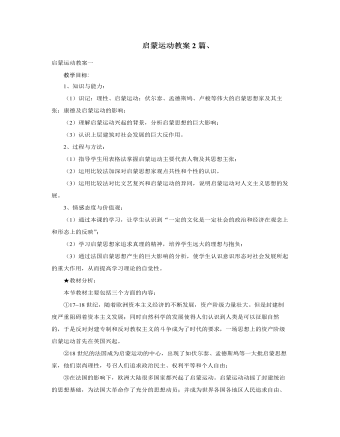
人教版高中历史必修3启蒙运动教案2篇
教学目标:1、知识与能力:(1)识记:理性、启蒙运动;伏尔泰、孟德斯鸠、卢梭等伟大的启蒙思想家及其主张;康德及启蒙运动的影响;(2)理解启蒙运动兴起的背景,分析启蒙思想的巨大影响;(3)认识上层建筑对社会发展的巨大反作用。2、过程与方法:(1)指导学生用表格法掌握启蒙运动主要代表人物及其思想主张;(2)运用比较法加深对启蒙思想家观点共性和个性的认识。(3)运用比较法对比文艺复兴和启蒙运动的异同,说明启蒙运动对人文主义思想的发展。3、情感态度与价值观:(1)通过本课的学习,让学生认识到“一定的文化是一定社会的政治和经济在观念上和形态上的反映”;(2)学习启蒙思想家追求真理的精神,培养学生远大的理想与抱负;(3)通过法国启蒙思想产生的巨大影响的分析,使学生认识意识形态对社会发展所起的重大作用,从而提高学习理论的自觉性。
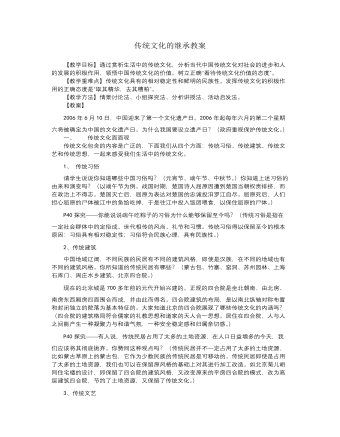
人教版高中政治必修3传统文化的继承教案
思考:在我们今天的生活中,应该如何认识“孝”道?(“孝”为中华民族传统道德之本。在封建社会,“孝”被异化为封建统治阶级统治人民、维系政权的一个最重要的工具;一切听命于“一家之长”的观念,使人们往往屈从于独断的权威或传统的家庭礼教,失去了独立的人格。另一方面,“孝”从它本身意义出发,所包含的尊老、敬老、养老,以及亲亲、爱人、爱国,正是中华民族的一大传统美德,是中华民族家庭和睦、邻里相亲、社会稳定的重要内在因素。因此,孝道已被列为中华传统道德教育的重要内容。)所以我们要辩证地认识传统文化在现实生活中的作用,做到“取其精华,去其糟粕;批判继承,古为今用”。对于传统文化中符合社会发展要求的、积极的、向上的内容,应该继续保持和发扬。对于传统文化中不符合社会发展要求的、落后的、腐朽的东西,必须“移风易俗”,自觉地加以改造或剔除。2、正确对待传统文化的意义
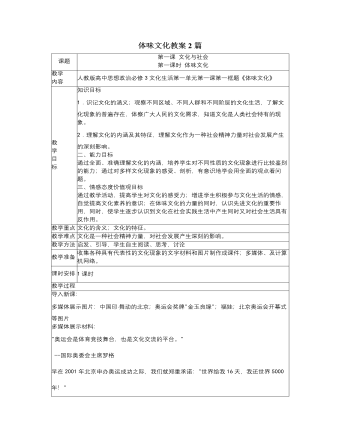
人教版高中政治必修3体味文化教案2篇
3、文化是人们的一种素养(1)人的文化素养是在社会生活、实践中形成的。每个人所具有的文化素养,不是天生的,而是通过对社会生活的体验,特别是通过参与文化生活、接受知识文化教育而逐步培养出来的。文化素养的形成,离不开生活、实践和教育。人们在社会实践中创造和发展文化,也在社会生活中获得和享用文化。(2)人的文化素养表现在日常言行中。教师活动:引导学生阅读教材7页“公交车漫画”材料,并思考所反映的问题学生活动:积极思考并讨论问题教师点评:人们的精神活动离不开物质活动,人们的文化素养总是要通过他在日常生活中的言行、在社会实践活动中的表现等表现出来。我们通过观察人们的社会行为,就可以从中透视人们的精神世界和精神生活。4、文化的传承和发展离不开物质载体。社会文化和精神产品离不开物质载体,一个时代的文化和精神产品,往往是这一时代社会发展轨迹的反映。
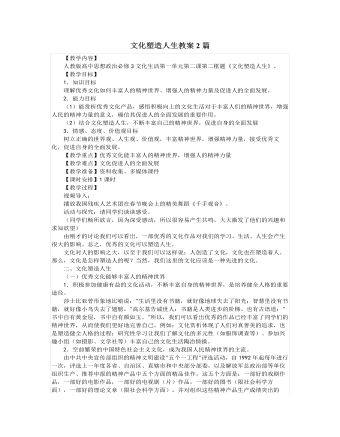
人教版高中政治必修3文化塑造人生教案2篇
【教学内容】人教版高中思想政治必修3文化生活第一单元第二课第二框题《文化塑造人生》。【教学目标】1.知识目标理解优秀文化如何丰富人的精神世界、增强人的精神力量及促进人的全面发展。2.能力目标(1)能赏析优秀文化产品,感悟积极向上的文化生活对于丰富人们的精神世界,增强人民的精神力量的意义,确信其促进人的全面发展的重要作用。(2)结合文化塑造人生,不断丰富自己的精神世界,促进自身的全面发展3.情感、态度、价值观目标树立正确的世界观、人生观、价值观,丰富精神世界,增强精神力量,接受优秀文化,促进自身的全面发展。【教学重点】优秀文化能丰富人的精神世界,增强人的精神力量【教学难点】文化促进人的全面发展【教学准备】资料收集、多媒体课件【课时安排】1课时【教学过程】视频导入:播放我国残疾人艺术团在春节晚会上的精美舞蹈《千手观音》。
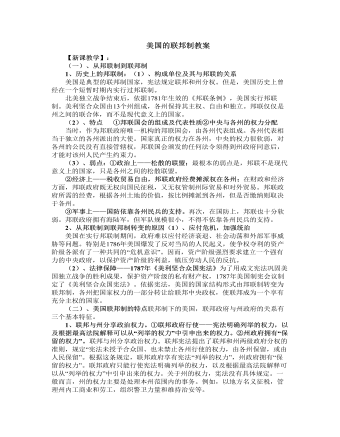
人教版高中政治选修3美国的联邦制教案
3、联邦制的弊端:(1)、效率不高:(2)、集团分享权力,维护资产阶级的利益,不顾人民要求。在美国实行联邦制的二百多年问,联邦制的弊端也显露无遗。美国联邦制的最大问题是效率不高,联邦政府与州政府之间相互扯皮、推诿,各州政府之间各自为政。全国性资产阶级利益集团与地方性资产阶级利益集团分享权力,对于广大人民群众的要求,资产阶级则利用国家结构形式的特点相互推卸责任。当大多数资产阶级利益集团意见接近时,联邦制既能保护州的灵活性,又能保证中央的权威;当资产阶级利益集团之间矛盾重重时,联邦制就处于低效运转之中。相关链接:1954年,美国最高法院在一项判决中宣布,公立学校实行种族隔离、拒绝黑人入学是违反宪法的。这一裁决引起南方一些州的抵制,一些州竟以暴力阻止黑人进入公立学校。
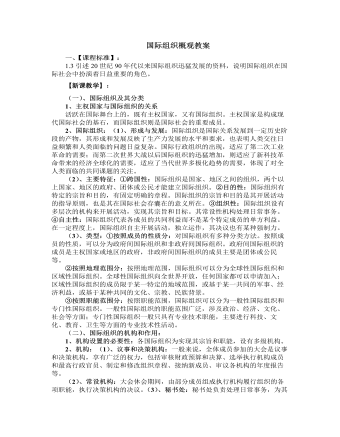
人教版高中政治选修3国际组织概观教案
4、中国积极发展与区域性国际组织的关系。中国积极发展与区域性国际组织的关系。中国与欧盟建立了领导人年度会晤机制,致力于发展全面战略伙伴关系。中国重视与非洲国家的传统友谊,与非洲联盟团结合作。中国与阿拉伯国家联盟、石油输出国组织等发展中国家组建的国际组织发展友好关系,支持它们维护自身的正当权益,并与它们共同为建立公正合理的国际政治经济新秩序而努力。新中国与国际组织关系的历史演变大致经历了三个时期。从中华人民共和国建立初期到1971年:新中国被排斥在联合国等国际组织之外,为恢复在联合国的合法席位进行了不懈的斗争。从1 9 7 1年到改革开放前:中国恢复了在联合国的合法席位,并与大批国际组织建立、恢复了友好合作关系。改革开放以来:中国恢复了在世界银行和国际货币基金组织的席位,加入了世界贸易组织、亚太经合组织等经济组织。世界银行出资兴建的希望小学小结:4个主要特征:国际组织的四个主要特征即:①跨国性、②目的性、③组织性、④自主性。
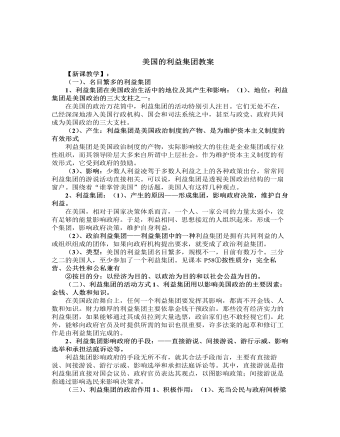
人教版高中政治选修3美国的利益集团教案
(3)、各种利益集团内部很少有什么民主机制,大都为少数人所控制——从利益集团内部的管理机制看;广大群众常常对某些组织寄予期望,投人力量,但是他们的利益却往往得不到关注。(4)、利益集团为政府腐败提供了肥沃的土壤。利益集团的活动方式,在很大程度上是用金钱购买政治影响力,是一种滋养腐败的行为——从利益集团对政府的负面影响看。实际上,在国会议员、政府官员与利益集团之间,已经形成一种相互依赖的共生关系。3、利益集团机制的隐蔽性、欺骗性及其实质:美国政坛中的利益集团机制,是资产阶级控制国家机器的一种特殊形式,具有相当强的隐蔽性和欺骗性。表面上看,利益集团是所谓的“民意代表”,向政府反映各阶层、群体的观点和利益,实质上是资产阶级在“民意”的幌子下控制权力。
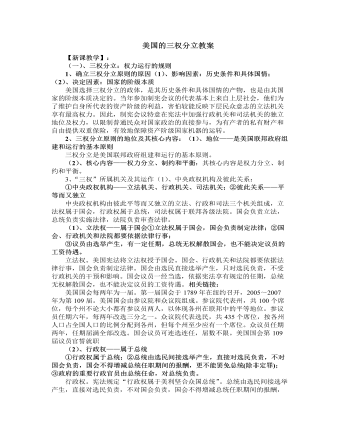
人教版高中政治选修3美国的三权分立教案
国会一直在政治生活中居于主导地位;到了当代,则是总统居于主导地位。由于司法机关无权直接支配社会力量和财富,相比之下,联邦法院力量向来较弱。第二次世界大战后,由于美国一直追逐全球霸权,美国总统的战争权力更加强化,向海外派遣军队的次数更加频繁。美国人民日益觉察到这种不断增长的“帝王般总统职位”可能带来的危险。2、三权分立制的本质——是一种资产阶级民主制度美国的三权分立制本质上是一种资产阶级民主制度。二百多年的历史经验表明,它有效地维护了美国资产阶级的统治。但是,广大劳动人民不可能在这种制度下享有真正的民主。虽然三大权力机关之间互相制约、平衡,却没有一个代表人民意志的权力机关,因而不可能实现人民群众的多数人统治。◇本框题小结:◇3个3种权力:3种权力即立法权、行政权和司法权;3个弊端:即三权分立原则的3 个弊端;3个中央政权机构即立法机关、行政机关和司法机关;◇2个原因:即确立三权分立原则的原因◇1个本质:即三权分立原则的本质
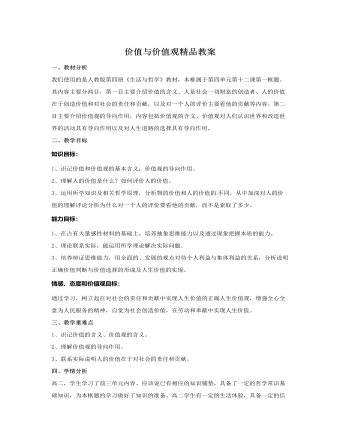
人教版高中政治必修4价值与价值观精品教案
一、教材分析我们使用的是人教版第四册《生活与哲学》教材,本框属于第四单元第十二课第一框题。其内容主要分两目,第一目主要介绍价值的含义、人是社会一切财富的创造者、人的价值在于创造价值和对社会的责任和贡献,以及对一个人的评价主要看他的贡献等内容。第二目主要介绍价值观的导向作用,内容包括价值观的含义、价值观对人们认识世界和改造世界的活动具有导向作用以及对人生道路的选择具有导向作用。二、教学目标知识目标:1、识记价值和价值观的基本含义;价值观的导向作用。2、理解人的价值是什么?如何评价人的价值。3、运用所学知识及相关哲学原理,分析物的价值和人的价值的 不同,从中加深对人的价值的理解评论分析为什么对一个人的评价要看他的贡献,而不是索取了多少。
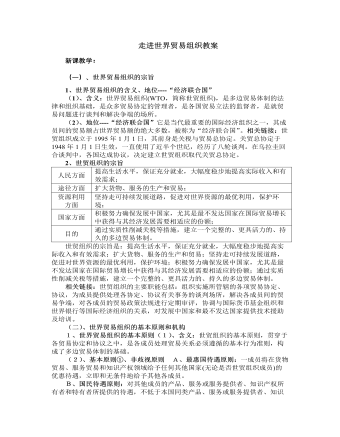
人教版高中政治选修3走进世界贸易组织教案
中国加人世贸组织承担的义务主要包括:进一步降低关税;取消非关税贸易壁垒;取消被禁止的出口补贴;开放国内市场,特别是服务市场;扩大对知识产权的保护范围;放宽和改善外资政策;增加贸易政策的透明度等。履行这些义务对中国提出了挑战。中国加入世贸组织后,享受多边、无条件、稳定的最惠国待遇和国民待遇;参与世贸组织各机构的所有会议;参与贸易政策审议,对贸易伙伴的贸易政策进行质询和监督;利用世贸组织的争端解决机制解决贸易纠纷;参与新一轮多边贸易谈判,制定多边贸易规则;享受发展中国家特有的权益。②意义:中国正充分行使这些权利,积极主动地参与、加强和发展多边贸易体制,推动建立公平、合理的国际经济新秩序,维护国家利益。相关链接:2005年7月.中国倡议的WTO小型部长级会议在大连召开,世贸组织总干事和三十多个成员的代表出席会议。
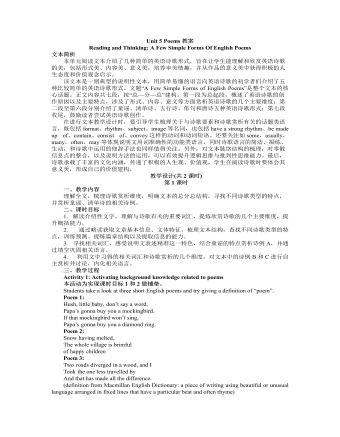
新人教版高中英语选修3Unit 5 Poems教案
本单元阅读文本介绍了几种简单的英语诗歌形式,旨在让学生能理解和欣赏英语诗歌的美,包括形式美、内容美、意义美,培养审美情趣,并从作品的意义美中获得积极的人生态度和价值观念启示。 该文本是一则典型的说明性文本,用简单易懂的语言向英语诗歌的初学者们介绍了五种比较简单的英语诗歌形式。文题“A Few Simple Forms of English Poems”是整个文本的核心话题。正文内容共七段,按“总—分—总”建构。第一段为总起段,概述了英语诗歌的创作原因以及主要特点,涉及了形式、内容、意义等方面赏析英语诗歌的几个主要维度;第二段至第六段分别介绍了童谣、清单诗、五行诗、俳句和唐诗五种英语诗歌形式;第七段收尾,鼓励读者尝试英语诗歌创作。 在进行文本教学设计时,要引导学生梳理关于与诗歌要素和诗歌赏析有关的话题类语言,既包括format、rhythm、subject、image等名词,也包括have a strong rhythm、be made up of、contain、consist of、convey这样的动词和动词短语。
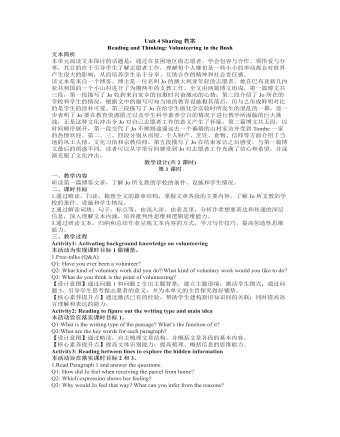
新人教版高中英语选修4Unit 4 Sharing教案
【核心素养提升点】学会将抽象信息进行可视化表达,提高信息处理能力和分析、推理等高阶思维品质;在跨文化交际中学会以国际视野接受和包容不同的文化。 5.Read Paragraph 2, draw a mind map and answer the questions. Q1:What did Jo learn about Tombe’s life? Q2:What kind of life do the natives lead? Read paragraph 2-5 and draw a mind-map. (Focus on accommodation, possession, diet and belief) 【设计意图】引导学生利用思维导图和问题链等形式来厘清当地人的生活方式,更好地处理和归纳信息 【核心素养提升点】提高信息处理能力、分析和归纳能力,包容异国文化、扩展国际视野。 6.Read Paragraph 3 and answer the questions. Q1:What was Jo’s feeling upon arriving her own home? Q2:Why would she feel that way? Q3:Do you think “It was such a privilege to have spent a day with Tombe’s family”? 【设计意图】通过提问,让学生理解Jo的苦并快乐的心情,并通过对“It was such a privilege to have spent a day with Tombe’s family”这句话的理解,体验志愿者生活的伟大。 【核心素养提升点】学会对信息的综合和归纳,从而理解作者所表达的观点。 Activity4: Summarize the change of Jo's feelings
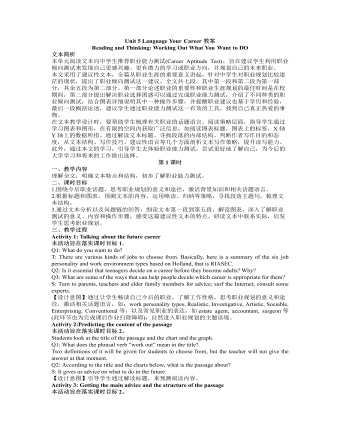
新人教版高中英语选修4Unit 5 Language Your Career教案
本单元阅读文本向中学生推荐职业能力测试(Career Aptitude Test),旨在建议学生利用职业倾向测试来发现自己更感兴趣、更有潜力的学习或职业方向,并规划自己的未来职业。 本文采用了建议性文本,全篇从职业生涯的重要意义讲起,针对中学生对职业规划比较迷茫的现状,提出了职业倾向测试这一建议。全文共七段,其中第一段和第二段为第一部分,其余五段为第二部分。第一部分论述职业的重要性和职业生涯规划的最佳时间是在校期间,第二部分提出解决职业选择困惑可以通过完成职业能力测试,介绍了不同种类的职业倾向测试,结合图表详细说明其中一种操作步骤,并提醒职业建议也基于学历和经验,最后一段概括论述,建议学生通过职业能力测试这一有效的工具,找到自己真正热爱的事物。 在文本教学设计时,要帮助学生梳理有关职业的话题语言。阅读策略层面,指导学生通过学习图表和图形,在有限的空间内获取广泛信息,如阅读图表标题,图表上的标签,X轴Y轴上的数据所指。
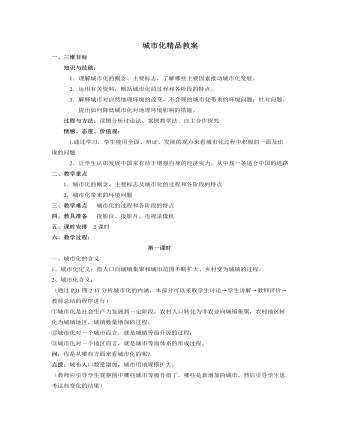
人教版高中地理必修2城市化精品教案
1.改善城市环境:治理河流、控制大气污染物、大力加强绿化建设为改善城市环境,上海市全面展开对大气、河流、噪声等多方面的治理工作。如苏州河的治理、降低城市污染物浓度、加强绿化建设,截止1990年,市区绿化覆盖率达到20.3%。2.改善城市交通、改善居住条件扩宽主干道,修建环城公路,修筑了南浦大桥和扬浦大桥,新修城市高架公路和地铁,改造住宅。3.控制城市规模建立卫星城,开发新区,有效地控制城市中心区的规模。思考:什么时候许多国家采取措施保护和改善城市环境?你认为可以采取哪些措施来保护和改善城市环境?上海市保护和改善城市环境的措施:上海的卫星城有哪些?上海新建了哪个新区?目前浦东新区在上海的地位如何?建立卫星城和开发新区可以起到什么作用?上海市为改善交通条件,做了哪些工作?
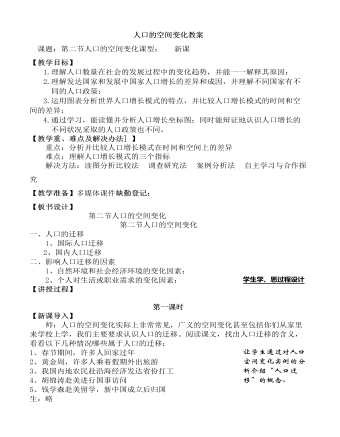
人教版高中地理必修2人口的空间变化教案
影响我国古代人口大规模迁移的因素,与影响我国近几十年人口迁移的因素有何不同?(古代:战乱,其次为开疆拓土、流放、戍边等。现代:国家政策、社会变革、经济发展、个人需求等。)2、为什么有这样的不同?(古代人口迁移受统治者及其行政力量的束缚。由于自给自足的经济十分脆弱,加之频繁的战争以及自然灾害等影响,人民难以安居乐业,不得不背井离乡大批迁移。近几十年来随着社会经济的发展、贸易的往来和交通的便捷,我国人口迁移不仅数量增加,而且频率加快,使各地人们的交往更加密切。)教师总结:从古今中外的人口迁移现象中,我们可以看出在人类历史早期人口迁移中重要的因素是什么?(自然因素)现在什么因素起重要作用?(经济因素)。但是在某种特定的时空条件下,任何一种因素都有可能成为促使人口迁移的决定性因素。【作业设计】查阅49年以来中国历年的人口数据资料,绘制人口增长的统计图表,探究中国人口增长的发展趋势
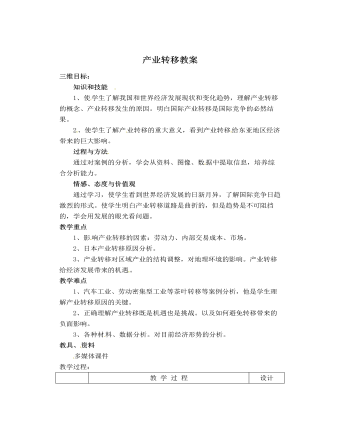
人教版高中地理必修3产业转移教案
1.国家石油价格上涨,导致依赖于国际石油而建立起来的日本重化工业的制造成本提高,产品价格相应提高,削弱了日本重化工产品在国际市场上的竞争力。2.日元 的大幅度升值,意味着日本产品在国际市场上的价格大幅度提高。例如,同样的日本产品,如果原来在国际市场上卖1美元,日元升值1倍后其在国际市场上的售价就达2美元。所以,以国际市场为依托的日本传统产业只好纷纷向海外转移。3.自身市场满足不了发展需求,国际市场上亚洲发展中国家和地区的同类产品具有明显的价格优势。所以,日本企业在其国内发展的空间很小。4.劳动力价格高反映为产品的价格高,而劳动力数量又满足 不了企业进一步扩展对劳动力的需求。所以,日本从事传统产业的国内企业生产受劳动力价格和数量的双重制约。5.促进日本企业生产的区位选择向国土的南、北部和海外扩展。6.“技术立国”的政策明显对传统产业在国内生产不利,即企业生产要么向知识技术密集型转换(这需要大量的投资),要么转向海外。
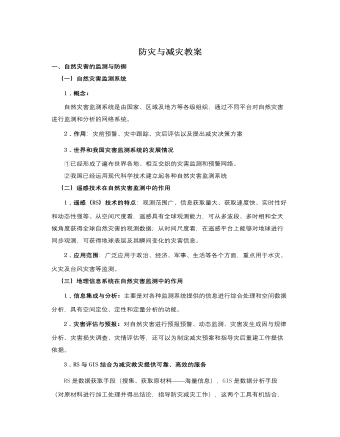
人教版高中地理选修5防灾与减灾教案
(一)自然灾害监测系统1.概念:自然灾害监测系统是由国家、区域及地方等各级组织,通过不同平台对自然灾害进行监测和分析的网络系统。2.作用:灾前预警、灾中跟踪、灾后评估以及提出减灾决策方案3.世界和我国灾害监测系统的发展情况①已经形成了遍布世界各地、相互交织的灾害监测和预警网络。②我国已经运用现代科学技术建立起各种自然灾害监测系统(二)遥感技术在自然灾害监测中的作用1.遥感(RS)技术的特点:观测范围广、信息获取量大、获取速度快、实时性好和动态性强等。从空间尺度看,遥感具有全球观测能力,可从多波段、多时相和全天候角度获得全球自然灾害的观测数据;从时间尺度看,在遥感平台上能够对地球进行同步观测,可获得地球表层及其瞬间变化的灾害信息。
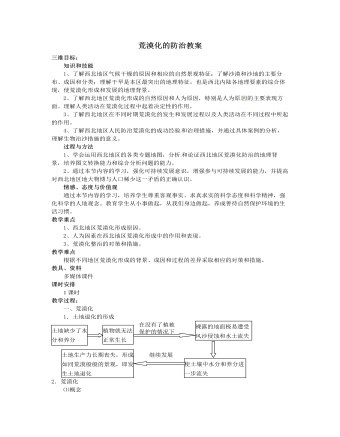
人教版高中地理必修3荒漠化的防治教案
1.萨赫勒地区位于撤哈拉沙漠的南缘。请根据下面的图文资料,并联系已学知识,分析萨赫勒地区的气候等自然特征,并说明荒漠化的潜在自然因素。点拨:资料表明萨林勒地区正处于干旱与半干旱、热带沙漠与热带草原的过渡地带;津德尔是其中有代表性的居民点,其月均温都在22℃以上,甚至达到33℃,可想而知其蒸发量是巨大的。在降水方面,这里的年降水量不足500毫米,且基本集中在夏季,特别是7、8两个月。以其有限的而且特别集中的降水状况与其全年的高温、高蒸发量相比,确实是个容易产生环境问题的敏感地区。客观上,这里就潜在着荒漠化的自然因素,这是本地区的地理位置和当地的水热条件所决定的。2.气候的严酷性决定了萨赫勒地区的传统经济以自给性质的游牧业为主。20世纪以来,随着沿岸国家人口和经济的发展及本区交通条件的改善,这里的传统游牧经济向商品性的定居牧业经济转化。

